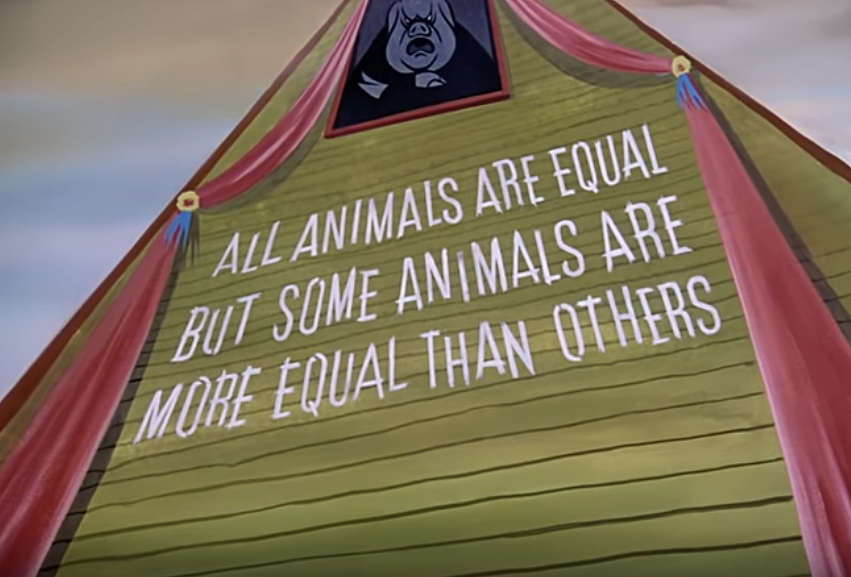Our View: Shameful in Seaside
Published 12:30 am Saturday, April 27, 2024

- Animal Farm
Editor’s Note: This editorial has been updated to reflect comments by Seaside City Councilor Steve Dillard after publication.
In the book “Animal Farm,” George Orwell’s 1945 fable about totalitarianism, the pigs that take power after animals overthrow Manor Farm eventually change the commandment “All animals are equal” to “All animals are equal, but some animals are more equal than others.”
We thought about those words when reading Seaside City Councilor Steve Dillard’s presentation for a work session Monday night on whether to pursue restrictions on sexually explicit materials for minors at the Seaside Public Library.
In his presentation, Dillard stressed that the discussion was not about freedom of speech or socially diverse books, but acknowledging that minors should be treated differently than adults.
Dillard wants to remove portions of the library’s policy manual that allow minors to access all library materials. He wants to establish a review committee comprised of a cross section of residents and parents to hear challenges to library materials instead of the Library Board. And he wants to set aside a dedicated section of the library for materials identified by the review committee as inappropriate for certain age groups. Minors could get access to the section with parental authorization.
The American Library Association detailed a record number of book challenges nationally last year, driven by conservatives who raised objections to materials that are sexually explicit or contain LGBTQ+ themes. The Oregon Intellectual Freedom Clearinghouse reported that 93 titles were challenged during the fiscal year that ended last June, a historic high.
Wendy Cornelisen, the Oregon state librarian, told The Astorian there appears to be a concerted effort to challenge books through lists being passed across the country.
The library association’s Library Bill of Rights, which has been embraced in Seaside, holds that the “right to use a library should not be denied or abridged because of origin, age, background, or views.”
“Libraries and their library governing bodies should not resort to age restrictions in an effort to avoid actual or anticipated objections, because only a court of law can determine whether or not content is constitutionally protected,” the association’s policy emphasizing free access for minors states.
The U.S. Supreme Court has recognized that minors have significant First Amendment rights — although not to the same degree as adults — and should be able to receive information and ideas at libraries.
Public libraries exist to provide free and equitable access. The first line of the mission statement in the policy manual at the Seaside Public Library is, “The freedom to know is the foundation of democracy.”
But there are some built-in safeguards in Seaside. Minors 17 and under can’t get a library card without a signature from a parent or guardian. Minors 10 and under can’t be left unattended in the library.
Anyone can file a request for reconsideration of books and other materials in the library collection and have the matter reviewed by the Library Board.
The library director is appointed by the city manager. The Library Board is appointed by the City Council.
These layers of checks and balances provide parental and city oversight while granting the library director and Library Board discretion to build a collection that reflects intellectual freedom, equal access and a documentary record of culture.
Age restrictions are at war with these principles.
“While anyone is free to select or reject materials for themselves or their own minor children, the freedom of others to read, view, listen or inquire cannot be restricted,” the collection access policy states.
Like in “Animal Farm,” the tell is how language is manipulated over time to exert power.
Seven of the 10 books on the American Library Association’s most challenged list for 2023 have LGBTQ+ themes.
The two children’s books flagged by residents in Seaside that the Library Board voted in January to keep on the shelves had LGBTQ+ themes: “And Tango Makes Three,” about two male penguins who raised an abandoned baby penguin at the Central Park Zoo in New York, and “When Aidan Became a Brother,” which details the coming out of a transgender child.
While Dillard tries to claim the issue is not about freedom of speech or socially diverse books, he criticized the library for promoting a banned book reading challenge to teenagers last fall.
Pressed at the work session on Monday to identify specific books that are sexually explicit, Dillard cited “Looking for Alaska,” a young adult novel by John Green, which deals with themes of friendship and loss, and “A Court of Mist and Fury,” fantasy fiction by Sarah J. Maas with emotional and romantic themes.
Both books are primarily aimed at young people, have been praised in book reviews and reached The New York Times bestseller list. They should not be defined solely by passages that depict sex — a standard so slippery that if applied consistently would taint some of the most cherished works of literature. They should not be labeled as inappropriate and segregated.
The only obscenity here, in our view, would be to empower small-town scolds to decide what anyone reads in our public libraries.





